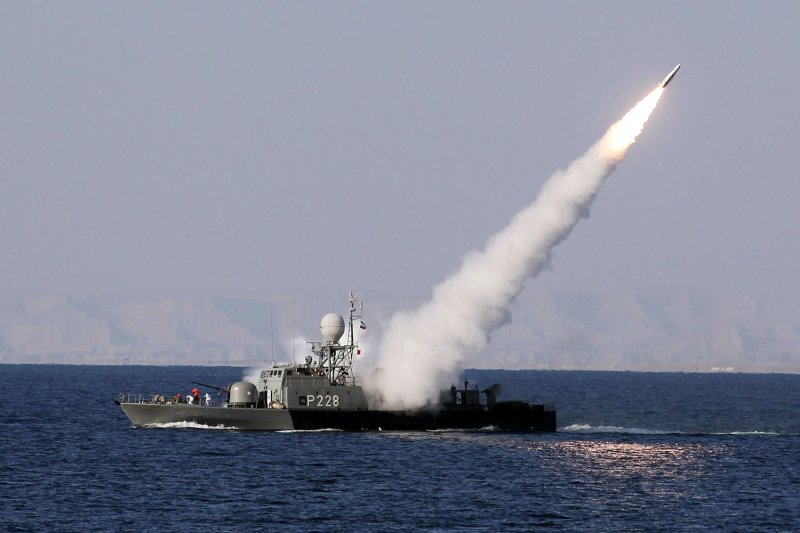An Iranian navy vessel fires a home-made surface to air short range missile named "Mehrab" during an Iranian military exercise on the Sea of Oman near the Strait of Hormuz in southern Iran on Jan 01,2012. UPI/Ali Mohammadi |
License Photo
WASHINGTON, Jan. 4 (UPI) -- Are we hearing the sounds of geostrategic and economic time bombs ticking around the world? Or are these sounds simply noise, static or imagined that since Sept. 11, 2001, and the 2008 financial meltdowns have been amplified into deafening proportions?
Europe is in the midst of economic and financial crises that spring from powerful and possibly irreversible political and social forces. Hence, this time bomb is real and is ticking.
In Russian, a Moscow "Spring" may or may not loosen Vladimir Putin's grip on power. Russians are discontent with poor governance. And Putin is clearly trying to defuse this time bomb.
North Africa and the Middle East remain highly volatile, potentially dangerous and unpredictable. In Libya, reports of al-Qaida extending its reach to that country are percolating. In Egypt, a combination of an army clamp down on democratic non-governmental organizations and the electoral success of sectarian political parties doesn't augur well for a democratic or peaceful future. Tick tock perhaps.
In China, both its leadership and that of outside regional and global powers have the same source of worry -- but for entirely different reasons. The worry is China. For China's leaders, the dangers are domestic. China faces severe social, political and economic dislocations. And extensive pollution and environmental destruction must be rectified.
Economic growth rate is essential to bring perhaps upward of a half billion Chinese above the poverty level. At the same time, a real estate bubble could be bursting. A new leadership takes over this year. Hence, China has much to worry about at home.
Outside states, namely the United States but also neighbors, cast China in a different light with its growing economy and military might as more than just competition. China's acquisition of a 40-year-old obsolete Soviet aircraft carrier proves to some a design for a "great yellow fleet" to contest the sea lanes. China surely is making ticking sounds. But the reasons are far more domestic than exaggerated fears of external aggression.
Twenty-something Kim Jung Un, the new North Korean leader, is no Alexander the Great or William Pitt the Younger who assumed office at similar ages. The betting is that North Korea will undertake some provocative move in part to demonstrate the firmness and solidarity of the new leadership. Perhaps shelling South Korea, sinking or hijacking another South Korean warship or conducting new missile and nuclear tests are possible ploys.
Yet, as its nuclear tests of a few years ago fizzled, North Korea may huff and puff and prove a further nuisance -- but with similarly marginal effect. The possible explosion is more likely to be a firecracker not a real time bomb.
Iran's regular navy has just conducted naval exercises as a signal to the West that should further economic sanctions be imposed to curb Iran's nuclear ambitions, the Strait of Hormuz could be closed to all traffic particularly oil. How much of this is naval bluster or a real threat remains to be seen. Interestingly, the more aggressive and ideologically driven Revolutionary Guard navy, assigned defense of Iran inside the Persian Gulf, didn't take part as the regular navy has responsibility for areas outside the gulf. At the same time, Iran has called for talks with the West and the United Nations on its nuclear program.
One Republican presidential candidate has promised that if Iran doesn't recant its nuclear ambitions, he would authorize airstrikes with Israel to eliminate Iran's nuclear weapons capacity. The obvious question and one that the second Bush administration never answered before going to war in Iraq in 2003 is "what next?" "What next?" is indeed the question to explore first in defusing this potential time bomb.
Last is Pakistan. A combination of the Raymond Davis affair in which three Pakistanis were killed last January; the bin Laden raid in May; and the late November attack in which two dozen Pakistani soldiers were killed by NATO forces in eastern Afghanistan has poisoned U.S. relations with Pakistan. Meanwhile, the country is in seeming turmoil over a nonsensical memo asking for U.S. help in constraining the Pakistani military that has become a political weapon for the opposition to attack the government aided by the Supreme Court.
In this vulnerable time, Americans remain transfixed with the security of Pakistani nuclear weapons -- which, by the way, have a better and safer track record than our own. Interestingly, even if the government doesn't survive this onslaught which it will, Pakistan has a constitutional means for a transition. The ticking time bomb here is really Afghanistan, not domestic Pakistani, politics and what happens as the West withdraws.
We hear a great deal of noise. But unless we learn to listen closely we will never determine which sounds are real and which are mostly noise, largely of our imagination or our ignorance.
--
(Harlan Ullman is chairman of the Killowen Group, which advises leaders of government and business, and senior adviser at Washington's Atlantic Council.)
--
(United Press International's "Outside View" commentaries are written by outside contributors who specialize in a variety of important issues. The views expressed do not necessarily reflect those of United Press International. In the interests of creating an open forum, original submissions are invited.)















